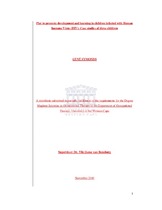| dc.description.abstract | The aim of this study was to explore the use of play with toddlers who are HIV positive to facilitate play, playfulness and sensory-motor development. The objectives were to explore how the therapist facilitated play, to explore how the child responded to the intervention, to explore how playfulness manifested as a facilitatory strategy and to explore how playfulness manifested as a response. A qualitative approach framed the case study research method with three participants between the ages of twelve months and three years. The main source of data was a record of the play-based intervention with the three participants. Additional data was obtained from participant observation of the children's responses to the play-based intervention, and hospital and occupational therapy record notes. A theory analytical strategy was used by coding data using theoretic propositions inductively. Each case was first analyzed individually, and then an analysis was made across the cases. Qualitative analysis of the data was done manually by coding, seeking categories and eliciting emergent themes by using an analytical strategy of theoretical propositions and an analytical technique of explanation building. Coding was done inductively, using theoretical constructs from the occupation by design, namely the elements of appeal, intactness and accuracy. Signs of playfulness were coded according to evidence of the elements of playfulness, namely perception of control, intrinsic motivation, suspension of reality or framing were evident in the data. Findings of the study were reported under two themes: Playful enablement - the therapist and Engaging, playing and developing - the child. | en_US |

